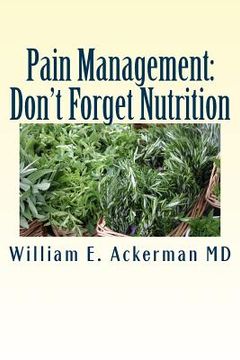Synopsis "Pain Management: Don't Forget Nutrition"
Almost everyone experiences pain at some time. Pain can be a natural response to injury and disease in some instances. With the advent of pain medicine as a medical specialty, patients no longer need to suffer. Suffering is how our lives are affected. Patients who suffer have significant reductions in the normal joys of their lives. They cannot enjoy their families or enjoy recreational activities etc. Their pain affects them emotionally. Pain is an unpleasant sensory and emotional experience following tissue injury. Pain occurs as a response to tissue irritation, injury, infection, ischemia or inflammation. Surgery may help decrease tissue irritation if it is caused by a disc herniation etc. Antibiotics may stop pain caused by infec-tions. Injury treatment may require steroids, orthopedic surgery, chiroprac-tic, physical therapy etc. Ischemia may require surgery or a stint. Inflammation may decreased by a proper diet such as the Mediterranean diet. The Mediterranean diet emphasizes eating foods like fish, fruits, vegetables, beans, high-fiber breads and whole grains, nuts, and olive oil. Meat, cheese, and sweets are very limited. Most pain however is a result of inflammation. Nutrition may be therefore helpful in decreasing inflammatory pain. Patients should try to avoid strong narcotic medications for any type of pain. Anti-inflammatory medications, anticonvulsants, steroid injections and mild pain medications may be of benefit. This book in addition to conventional pain management addresses nutrition for pain reduction. Unfortunately, it is the rare physician who includes diet therapy and nutritional supplements in patient care. Inflammation is one of the causes of chronic pain and this can be re-lated to diet. The ratio between omega six and omega-3 fatty acid's used to be 1 to 1 to 2 to 1 in the average diet twenty years ago. Today it is 20 to 30 to 1 in the Average American diet. This causes chronic inflammation. Trans fatty acids in the diet are bad they can inhibit the formation of enzymes that are needed to decrease the inflammatory process. Pro-inflammatory chemicals include linoleic acid, vegetable (oil corn and saffron oil), and arachidonic acid. These are free radicals and cause inflammation and pain as well. Many of the inflammation-sustaining fats are found in common cooking oils and packaged foods. When a balance of dietary fats is restored, through diet and supple-ments, the body regains its natural ability to both turn on and turn off inflammation. Elevated blood sugar (glucose) levels, stemming from a diet with too many refined carbohydrates and sugars, also can increase inflammation in the body. People with insulin resistance commonly have high levels of C-reactive protein, a sign of inflammation. Insulin resistance is at the heart of Syndrome X and type 2 diabetes. Syndrome X, which increases the risk of both diabetes and heart disease, is also marked by fat around the waist, high blood pressure, and high cholesterol and triglycerides. Free radicals are found in virtually all unsafe chemicals, including air pollutants and cigarette smoke, and are generated when your body is exposed to radiation. Free radicals stimulate inflammation. The natural remedies for free radicals are antioxidants, which include vitamins E and C and many other nutrients. The many flavonoids found in vegetables, fruits, and herbs directly counteract the pro-inflammatory effects of free radicals. Vitamins, minerals, proteins, and fats-are the building blocks of your entire body. They form not only your skeleton, skin, and organs, but are also the basis of your hormones and the multitudes of biochemicals involved in forming new cells and tissue, healing injuries, and creating energy. Pomegranates for example alleviate disease activity and improves some bio-markers of inflammation and oxidative stress in rheumatoid arthritis patients.

